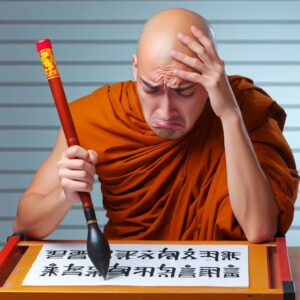弘法も筆の誤りとは?
「弘法も筆の誤り(こうぼうもふでのあやまり)」は、いかに優れた人物や名人であっても、たまにはミスをすることがある、という意味の日本のことわざです。これは、自分が一流だとされる分野でも、絶対的に完璧ではないこと、また、失敗をすることがあるのは人間である以上当然だという謙虚な視点を示しています。
このことわざに出てくる「弘法」とは、平安時代の高僧・空海(くうかい)のことです。空海は真言宗の開祖で、書道にも非常に優れた技量を持っていました。そのため、彼が一筆を誤ることは滅多になく、当時から「筆の達人」として広く知られていました。しかし、そんな空海でさえもたまには書き損じることがある、というところから「弘法も筆の誤り」という言葉が生まれました。
このことわざは、特に以下のような場合に使われます。
名人でも失敗することを表す
どれだけ専門的で熟練した人でも、ミスをすることがあるということを表現する際に使います。
人間味や謙虚さを伝える
他者のミスに寛容になり、他人や自分を責めすぎないように促す際にも使われます。
この表現には、同時に「失敗を恐れず努力することの大切さ」や、「他人の失敗に対して理解を示す姿勢」といった意味合いも込められており、古くから広く親しまれています。
Koubou mo fude no ayamari” is a Japanese proverb meaning that even the best people and masters can make mistakes from time to time. This shows a humble viewpoint that even in a field in which one is considered top-notch, one is not absolutely perfect, and that it is natural for human beings to make mistakes.
The “Kobo” in this proverb refers to Kukai, a high priest of the Heian period (794-1185). Kukai was the founder of the Shingon sect of Buddhism and was also extremely skilled in calligraphy. As a result, he seldom made a single brushstroke wrong and was widely known as a “master of the brush” from that time on. However, even Kukai sometimes made a mistake in writing, which gave birth to the saying “Kobo also makes a mistake in writing.
This proverb is used especially in the following cases
To show that even a master can make mistakes: It is used to express that even the most expert and skilled people can make mistakes.
Conveying humanity and humility: It is also used to encourage people to be tolerant of others’ mistakes and not to blame others or themselves too much.
At the same time, this expression also has connotations such as “the importance of trying without fear of failure” and “an attitude of understanding toward the failures of others,” and has been widely used since ancient times.
AIが描いた「弘法も筆の誤り」







コメント